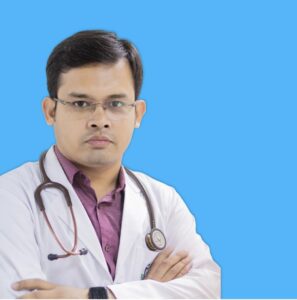 Today is World Hypertension Day 2023. Dr Abhishek Bhadra, a young public health expert and promising physician involved in medical teaching at Popular Medical College, Dhaka, speaks with us about the significance of the day and Hypertension in depth.
Today is World Hypertension Day 2023. Dr Abhishek Bhadra, a young public health expert and promising physician involved in medical teaching at Popular Medical College, Dhaka, speaks with us about the significance of the day and Hypertension in depth.
Today is World Hypertension Day. Why is this day observed every year around the world?
Dr Abhishek: Every year on May 17, World Hypertension Day is observed to raise awareness about hypertension and encourage people to take action to prevent, detect, and control it. The day promotes the need for blood pressure monitoring, leading a healthy lifestyle, getting regular medical care, and encouraging collaboration among healthcare professionals, organisations, and legislators to address the global effect of hypertension through detection, and effective management.
What is the theme of the day this year?
Dr Abhishek: ‘Measure Your Blood Pressure Accurately, Control It, Live Longer’–is the theme for World Hypertension Day 2023. World Hypertension Day aims to reduce the effects of high blood pressure on people’s health and overall well-being worldwide by promoting prevention, early detection, and effective management.
Please inform us about hypertension as a physician. For example, if one is unfamiliar with hypertension, give him a basic introduction.
Dr Abhishek: High blood pressure, or Hypertension is a condition when the arterial blood pressure (BP) of the body persistently rises higher than the normal level. The typical blood pressure level is 120/80 mmHg. According to the American Heart Association, hypertension is defined as systolic blood pressure greater than 140 mmHg or diastolic blood pressure greater than 90 mmHg. However, the Sigle measurement is not reliable for classifying someone as hypertensive. A physician should confirm it with more than one elevated blood pressure reading.
Why should people be concerned about hypertension?
Dr Abhishek: According to the World Health Organization (WHO), hypertension affects around one billion people globally, with consequences resulting in over 7.5 million deaths each year. Furthermore, hypertension is a major cause of a variety of health problems, including strokes, heart attacks, and kidney disease, and it can also lead to dementia. It is a major risk factor for heart failure and atrial fibrillation in the elderly.
What are your thoughts on when it is appropriate to check one’s blood pressure?
Dr Abhishek: Many people who suffer from Hypertension are unaware that they have it as there are no symptoms, and hence it is often called “The silent killer”. While undetected, it can cause damage to the cardiovascular system and internal organs. For this reason, regularly checking up on your blood pressure is vital, especially for people in the middle and old age groups, as there will usually be no symptoms to make you aware of the condition. However, severe Hypertension shows some symptoms of headaches, sleepiness, palpitation, blurred vision, fatigue, dizziness, confusion, ringing sensations in the ears, breathing difficulty, and an irregular heartbeat, which may even lead to coma. If anyone experiences these symptoms, he/she should check their blood pressure and consult a doctor.
What are the actual causes and major risk factors for this silent killer?
Dr Abhishek: Like other non-communicable diseases, Hypertension is not caused by any organism or causative agent. Rather, some risk factors and secondary consequences of some diseases are responsible for the high blood pressure of an individual. Notably, in about 90% of cases, there is no specific reason or cause behind high BP; this is called primary or essential blood pressure and is more likely to be common in the elderly. In contrast, causes of secondary Hypertension are kidney damage, adrenal gland overactivity, sleep apnea syndrome, tumours, recreational drugs, thyroid gland dysfunction, aortic coarctation, pregnancy-related conditions. etc. On the other hand, age, positive family history, smoking, alcohol, excess salt intake, obesity, diabetes, sedentary lifestyle, and excess stress are the main risk factors for Hypertension.
What are the effects of high blood pressure on our bodies?
Dr Abhishek: Uncontrolled blood pressure, without a doubt, can have serious consequences for the body’s vital organs. Consequences of Hypertension can cause numerous serious complications, for instance, myocardial infarction in the heart, stroke in the brain, and renal failure in the kidney that may even lead to death. Nevertheless, blindness can occur due to retinal damage in the eye of a person with prolonged and uncontrolled blood pressure.
How do doctors diagnose Hypertension?
Dr Abhishek: Alarmingly, about half of the population with Hypertension, is unaware of their condition, and some of those who are aware of it do not take any preventive or medical action for their high blood pressure. A single rise in blood pressure is not diagnostic; at least three recordings of high BP under defined conditions are needed to diagnose a person as hypertensive. Additionally, some routine investigations are needed to evaluate or exclude the other diseases resulting secondarily from Hypertension.
What should a person do if he is diagnosed with hypertension?
Dr Abhishek: True to say, hypertension is not a curable disease, however, it is preventable and can be controlled by some simple but effective measures. To treat primary hypertension, one must change their lifestyle and follow healthy living habits such as quitting smoking and limiting alcohol consumption, limiting sodium intake to 1.5 to 2.5 grams per day, eating a low-fat and high-fiber diet, eating fruits and green vegetables, practicing proper physical exercise, maintaining a healthy weight, reducing stress, getting enough sleep, and checking blood pressure regularly. In addition, any medicine provided by a doctor should be continued.
Many people are frightened of taking hypertension medication because they believe that once started, it must be continued for the rest of their lives—is this true?
Dr Abhishek: Yes, we frequently encounter this situation. It is important to remember that antihypertensive medicine should not be stopped even after a good recovery from high to normal BP. It should be continued lifelong, but a doctor needs to adjust doses or the number of medicines when necessary. Last but not least, regular follow-up is the secret to prolonging the well-controlled phase of Hypertension.
As a physician and public health expert, what is your recommendation for people who are not hypertensive yet? How can they prevent it?
Dr Abhishek: As a physician and public health specialist, I can offer some suggestions for preventing hypertension in people who are not currently hypertensive. Maintain a healthy weight; consume a diet rich in fruits, vegetables, whole grains, lean proteins, and low-fat dairy products; reduce salt intake; regular exercise; quit smoking, managing stress and regular checking blood pressure are the key to prevent hupertension
Please leave one last comment for our readers.
Dr Abhishek: To be more specific, I would say it is seen that prevention is the primary key to avoiding hypertension, and it completely depends on our will and work. If we can make these preventive measures achievable by changing our modern sedentary and foodie lifestyles and raising awareness about healthy health habits among people of all classes and ages around us, the goal of marking ‘World Hypertension Day’ may be achieved.







